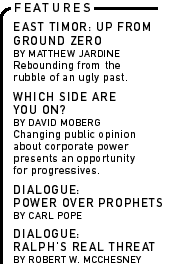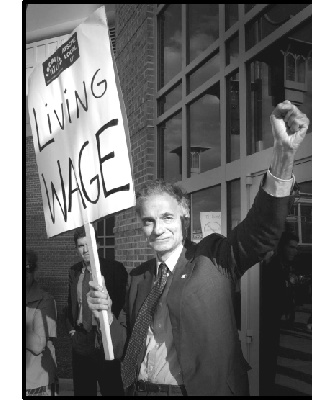 
|

|

|

|
| |
|
|
|
Few issues have aroused such passion and debate on the American political left as how to approach this year's Nader-LaDuke Green Party campaign for the White House. For those who support the progressive policies of Nader and LaDuke, the questions are tactical: Will a vote for Nader help to elect Bush, a truly horrendous and reactionary fool? Is the Nader campaign a necessary step in breaking out of the downward cycle of "lesser-of-two-evils" politics? Is the ultimate route to advancing left electoral politics to come through the Democrats or through a third party like the Greens? Whatever one thinks of Nader's campaign, a discussion of these sorts of long-term strategic issues has been long overdue, which explains the passion and intelligence of much of this debate. I have made my own case for why I believe it important for those on the left to support Nader. Some people like In These Times founder James Weinstein and editor Joel Bleifuss disagree. Although they have raised some strong points, on balance, I think they are wrong. But with the publication of Carl Pope's piece, the debate in this magazine has careened off the tracks. Since this is a strategic and tactical debate over whether or not to pull the lever for
As of this writing, the outcome in around half the states effectively has been decided. If someone lives in states like Texas, Indiana or Arizona, they can vote for Nader with complete and total peace of mind because Gore doesn't have a prayer. Likewise, there are several places--Massachusetts and the District of Columbia are obvious ones--where Gore has a commanding lead. If everyone sympathetic to Nader voted for him, Gore would still carry these states with ease. And Gore has recently built up solid leads of 5 to 10 points in many states across the Northeast and Midwest. If Bush's campaign continues to flounder--and his incompetence, corruption and stupidity become more apparent--only the most cautious souls in the few states where the race is close need consider a vote for Gore. But even if the outcome remains in doubt to the end, some 40 states still should be clearly in the Bush or Gore column beforehand. In this light, assuming votes for Nader do not cost Gore the election, it is in the interest of all progressives, all who believe Nader is right on the issues, for his campaign to do well this year. If Nader can get 5 percent of the vote, it will guarantee some $12 million in matching funds to the Greens in 2004. In view of the media blackout of the Nader campaign and its lack of money, getting 5 percent of the vote would be a huge victory and would invigorate organizing in the coming years. Now some sympathetic to left politics but committed to working within the Democratic Party might find this counterproductive. They might fear that an established Green Party would undermine our ability to push the Democrats to the left. I think that is wrong. If Nader does get less than 5 percent of the vote, it will spell disaster for progressive electoral politics. If Nader gets smashed down to 1 or 2 percent of the vote, it will send a clear message that there is no viable constituency for left politics in this country. It will demoralize all progressives immeasurably. But if Nader does well, it will assure those working within the Democratic Party that there is a base of voter support for their policies. Let me reiterate this crucial point: The progressive wing of the Democratic Party has been crushed by the pro-corporate Democratic Leadership Council over the past two decades. It only looks to get worse. It used to be that "moderate" Democrats like LBJ and Jimmy Carter picked liberals like Hubert Humphrey and Walter Mondale to balance the ticket. With the moderate Gore's selection of the militaristic, business-loving Lieberman, he raised a middle finger to the left in the party and the nation. And now we are supposed to believe that Nader getting 1 percent of the vote instead of 5 percent or more will increase progressive leverage within the party? I don't think so. There is another reason why Nader doing well is crucial to the development of left electoral politics. It is arguable that the electorate, even with our pathetic news media, is well to the left of the established political parties. Survey after survey finds considerable popular support for progressive issues like single-payer health insurance and campaign finance reform. Both Bush and Gore made their largest gains in the polls when they pitched their campaigns to the left of their standard comfort zones. In each case this was the result of extensive focus-group research on likely voters by the campaigns, not a sincere shift in thought by the candidates. Moreover, the majority of adults are now non-voters, and as they are disproportionately young, minorities and working-class, they fit the profile of those more inclined to vote left. Were it not for the electoral system and the role of big money, U.S. politics would be well to the left of where it is today. One of the core problems the left faces is that many Americans consider politics irrelevant and see little difference between the parties. In the official culture, Clinton and Gore are the left-wing, which means most Americans don't even have a sense of what progressive politics actually look like. If Nader succeeds this fall, his greatest contribution may be establishing a place for progressive politics in our political culture. Millions of people oblivious to left ideas might be exposed to them. I can hardly exaggerate how important this will be to the left's long-term prospects. Likewise, if Nader flops this fall, our job will be doubly difficult. This is Nader's real threat to the status quo. The corporate establishment knows he is not going to win the election, but they are scared to death of the politics he represents. They want the world to see Gore-Lieberman as the left edge of permissible thought. Accordingly, The New Republic, New York Times and Washington Post, to name a few, have engaged in a character assassination of Nader and his campaign worthy of Pravda's treatment of Andrei Sakharov. The Times, for example, has probably given Nader a minute fraction of the coverage it has provided Bush or Gore, but it has printed no less than four editorials and columns in the past 10 weeks attacking Nader that were filled with half-truths, innuendo and flat-out lies. Likewise, the Gore campaign has sent out its liberals to lead the charge against Nader, arguing to those on the left that a vote for Nader would lead to the ruination of the republic. Principled Democrats like Paul Wellstone, Russ Feingold and Jesse Jackson Jr., who are more interested in advancing progressive politics than winning brownie points from the DLC, will have nothing to do with this charade. But others, like Barney Frank, are trotting around the nation bashing Nader in the most unscrupulous manner imaginable. Enter Carl Pope. There are no concerns here with how best to advance progressive politics. There is no discussion of tactical voting in states where a vote for Nader will not hurt Gore. There is no recognition whatsoever of the problems with Gore and the corporate domination of the Democratic Party. That's because Pope isn't on the left; he isn't a progressive in the contemporary usage of the term. He has supported the mainstream of the Democratic Party over his long career. His career has been filled with attempts to reduce the influence of the left in the Sierra Club and the environmental movement, to keep it respectable for corporate America. And it appears he wants to do the same thing to the Democratic Party. To employ Dick Cheney's vernacular, Pope supports Gore "big time." For Pope to argue the truth, that he supports Gore's politics and has been Gore's main advocate in the environmental movement for more than a decade, would be counterproductive. His assignment is to go around and thwart the rebellion against Gore by any means necessary. So Pope submits this disingenuous and sloppy piece of propaganda to In These Times to serve the Gore campaign. (How sloppy? As key evidence, Pope tells us the great Bob LaFollette didn't believe in third parties. In fact, LaFollette, out of disgust with the status quo, established the Progressive Party and got 17 percent of the 1924 presidential vote on that ticket.) Pope fraudulently masquerades as someone who supports Nader on the issues but has been reduced to endorsing Gore this time because of the technical nature of the two-party system. In the process, he presents a mean-spirited and vicious diatribe against Nader, his supporters and his campaign, all with the aim of discrediting them. This is not meant to contribute to a comradely debate among progressives, and it doesn't. I am not trying to convince the Carl Popes of the world to vote
for Nader. They should vote for Gore. My concern is with those who
actually support Nader's policies, who are on the left, who want
to advance progressive politics, and who are understandably concerned
about the prospect of a Bush-Cheney administration. That is the
important debate that belongs in In These Times. Now read Carl Pope's response, "Power Over Prophets."
|


